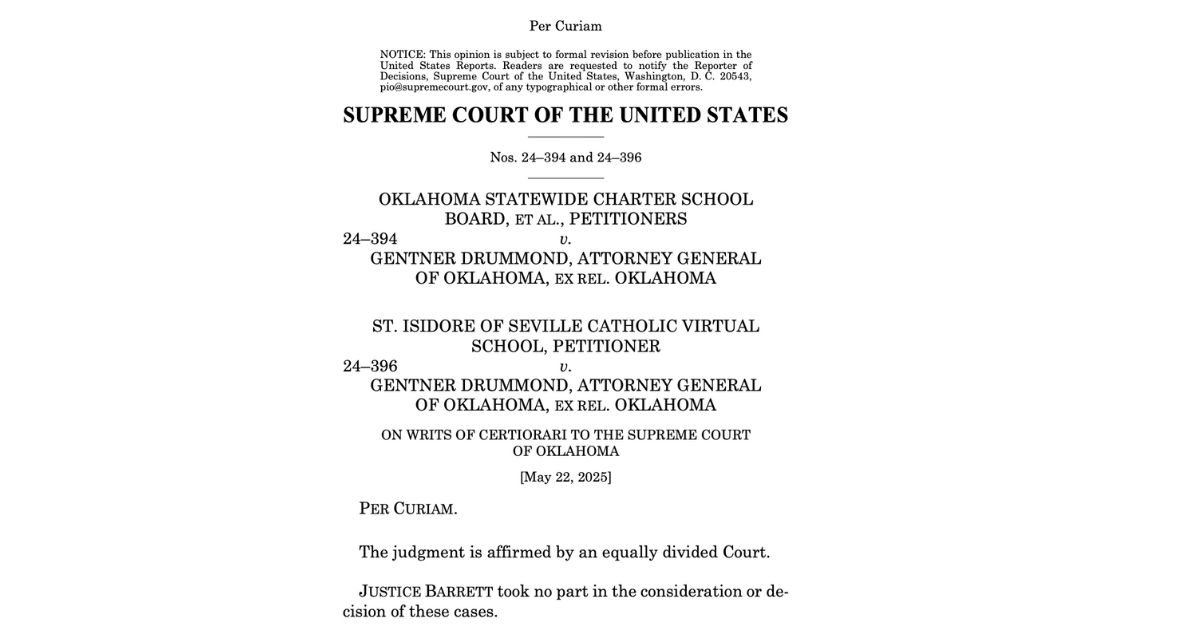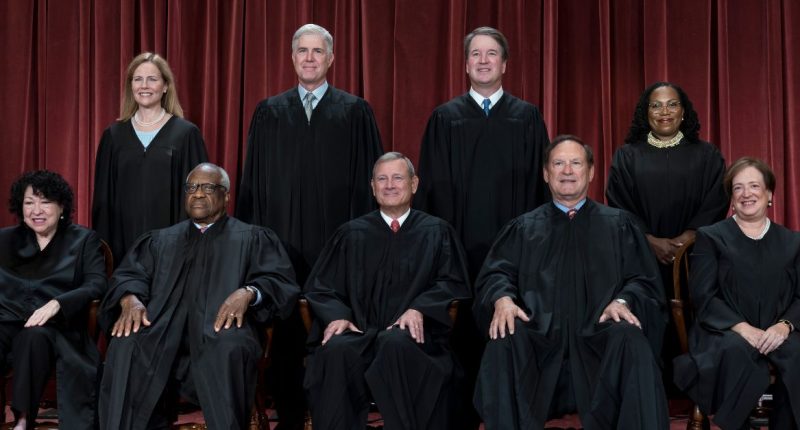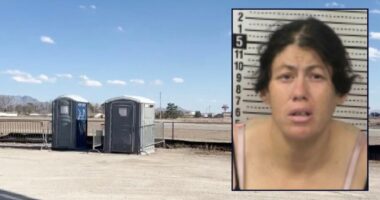Share this @internewscast.com
Members of the Supreme Court are pictured in a new group portrait following the addition of Associate Justice Ketanji Brown Jackson, at the Supreme Court building in Washington, on Friday, Oct. 7, 2022. The bottom row, from left to right, includes Associate Justice Sonia Sotomayor, Associate Justice Clarence Thomas, Chief Justice of the United States John Roberts, Associate Justice Samuel Alito, and Associate Justice Elena Kagan. The top row, from left to right, features Associate Justice Amy Coney Barrett, Associate Justice Neil Gorsuch, Associate Justice Brett Kavanaugh, and Associate Justice Ketanji Brown Jackson. (AP Photo/J. Scott Applewhite)
As many had anticipated, the U.S. Supreme Court delivered a 4-4 decision on Thursday that, at least temporarily, upholds the separation between church and state. Although the eight justices who participated had been quite expressive during oral arguments merely three weeks prior, the Court released its decision without any accompanying opinion, guidance, or details on the vote breakdown.
“A robust Catholic education”
The case, known formally as Oklahoma Charter School Board v. Drummond, involved intense debate as the justices engaged in prolonged oral arguments over the issue of whether a virtual Catholic charter school has the right to operate, given Oklahoma’s stipulation that charter schools remain nonreligious. St. Isidore of Seville school — named after an unofficial patron saint of the internet — aspires to offer a “robust Catholic education,” available to both Catholic and non-Catholic students. The school, intended to function entirely online, anticipated an initial enrollment of 500 students, with projections to expand to 1,500 students by 2028, including half from low-income families.
Love true crime? Sign up for our newsletter, The Law&Crime Docket, to get the latest real-life crime stories delivered right to your inbox.
Although Oklahoma’s charter school board initially approved St. Isidore’s application for the 2024-25 school year, Oklahoma’s Republican attorney general and current gubernatorial candidate, Gentner Drummond, opposed the school’s participation in the charter program on the grounds that under both Oklahoma law and the establishment clause of the U.S. Constitution, all public schools in the state are required to be nonsectarian.
A “slippery slope” for freedom of religion
The Oklahoma Supreme Court sided with Drummond and issued a court order directing the charter board to invalidate its contract with the school. On appeal, the U.S. Supreme Court justices considered whether the charter school contracting process constituted ” state action,” and if so, whether excluding St. Isidore’s from the program constituted a violation of the institution’s First Amendment right to free exercise.
The Oklahoma court’s opinion was quite clear about the legality of using public funds to support a religious school:
The framers’ intent is clear: the State is prohibited from using public money for the “use, benefit or support of a sect or system of religion.” Although a public charter school, St. Isidore is an instrument of the Catholic church, operated by the Catholic church, and will further the evangelizing mission of the Catholic church in its educational programs. The expenditure of state funds for St. Isidore’s operations constitutes the use of state funds for the benefit and support of the Catholic church. It also constitutes the use of state funds for “the use, benefit, or support of … a sectarian institution.” The St. Isidore Contract violates the plain terms of Article 2, Section 5 of the Oklahoma Constitution. Enforcing the St. Isidore Contract would create a slippery slope and what the framers’ warned against-the destruction of Oklahomans’ freedom to practice religion without fear of governmental intervention.
Likewise, the Oklahoma Supreme Court found that funding St. Isidore’s as part of Oklahoma’s public school program would be an unconstitutional violation of the U.S. Constitution’s establishment clause, and that St. Isidore’s lacks any valid free exercise clause grounds upon which to contest its exclusion.
The justices take sides
During the hours of oral arguments before the Supreme Court, all justices except Chief Justice John Roberts gave clear indication of where they stood on the case. The Court’s liberal flank spoke up time and again about the purpose of the establishment clause.
“I think the essence of the establishment clause was, ‘We’re not going to pay religious leaders to teach their religion,”” said Justice Sonia Sotomayor to the attorney for Oklahoma’s charter school boards.
Similarly, Justice Elena Kagan said that allowing St. Isidore’s to receive a charter despite the state rule against it would amount to letting St. Isidore’s simply “strike” provisions of state law it dislikes.
Likewise, Justice Ketanji Brown Jackson emphasized that Oklahoma wished to set up secular schools and that it has a right to do just that.
The Supreme Court’s conservative justices also provided insight as to their positions. Justices Neil Gorsuch, Brett Kavanaugh, Samuel Alito, and Clarence Thomas all indicated a willingness to side with St. Isidore — albeit for a variety of reasons. Gorsuch appeared unconvinced that the charter process amounted to “state action” at all. Kavanaugh and Alito, on the other hand, focused on the import of “excluding” a Catholic school from an opportunity that was open other nonreligious entities.
Only Roberts remained cryptic as to where he stood on the case, hinting that he agreed the charter process amounted to government action. Onetime MAGA darling Justice Amy Coney Barrett was recused from the case, due to a friendship with a professor who advised St. Isidore.
A silent tie
In a one-line per curiam opinion handed down Wednesday, the justices ruled to affirm the Oklahoma Supreme Court’s ruling. The ruling, which can be seen in its entirety below, says only that it was issued by an “equally divided Court” that did not include Barrett. Although the justices gave indications during oral arguments as to their thoughts on the case, the ruling provides no definitive information as to how any particular justice voted.

The 4-4 ruling is a clear win for Oklahoma — but still leaves the primary questions in the case open in the broader context. A split ruling such as this one means that the lower court’s ruling stands. However, the decision does not carry the weight of precedent.
The question of whether a state can legally include or exclude religious schools in its charter program has set up significant legal tension between the establishment clause and the free exercise clause. As Oklahoma argued in this case, those that wish to keep public funds from supporting religious schools argue that allowing religious charter schools amounts to government endorsement of a religion in contravention of the establishment clause.
By contrast, others, like St. Isidore, argue that singling out religious schools to disallow them in the program raises a concern of its own — namely, that states may not make laws that impede the free exercise of religion. The justices’ ruling Thursday does little if anything to resolve this tension. Rather, the question is held in abeyance, perhaps waiting for the next case in which Barrett could cast the deciding vote.















